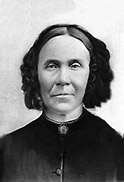Mary Hopkins Walker ~ Index
Mary H. Walker >
Mary Hopkins was born 20 September 1815 at Upton Lincolnshire, England. She married George Walker on 27 March 1836 and was a noble, energetic wife. Her husband's father and mother joined the Church and father was much in favor, in fact he believed, but did not join until mother was ready.
My grandfather Walker was very anxious for them to join, but mother was a strong believer in the Church of England and it was almost impossible to convert her. Grandfather would say to her, Now Mary, You will sure join this Church, I know you will,
but mother would always answer, I will never join.
At this time mother had a sore hand. It became so painful that she walked the floor day and night. Grandfather would come and talk to her and many times wanted to administer to her, but mother would not listen. Grandfather was patient and hopeful, and continued his visits. One night, as usual, he came. The pain in mother's hand was so intense, she felt unable to stand it. Grandfather again asked if he could administer to her. Mother replied, If you think that it will do any good, come and do it.
Grandfather said, Mary, I knew you would see, you will yet be a member of this Church.
He administered to her and her hand was healed. This was a testimony to mother.
In 1849, along with father and two children, she was baptized and confirmed a member of this church. Three children died and were buried in England. Father, mother and three children came to America in 1850. Mother said goodbye to her father and mother, brother, sisters and friends, never to see them again. Her mother kissed her and said, Mary this is goodbye for ever.
But Mary said, Oh no, mother dear, I will come back.
She did not know of the trials and hardships that were before her that would make it impossible for her to return to her loved ones.
The first year in America, they lived in Missouri. They had no friends and very poor accommodations. Shortly after they moved to Missouri, their oldest son, thirteen years old, died, being beautiful kind and gentle. Mother grieved so over his death that he came to her in a dream and said, Mother, don't grieve for me, you grieve God when you grieve for me. I am alright and happy.
This was a great comfort to her who had made such a sacrifice for this Church.
They were joined at Missouri by my grandfather and grandmother Walker, but soon after, grandfather died. In this great sorrow of loosing grandfather and their son they drew closer to my grandmother and were more determined to go to the valley of the Great Salt Lake. They started the next spring, 3 May 1852, in the Townsend and Walker company, with ten wagons in the train. Grandmother Walker failed to reach the valley; she fell sick on the hot plains and died about the last of July, 1852 along the Platte River. They wrapped her in a blanket and buried her by the roadside. In Utah, my father and mother first settled in Cottonwood, where their daughter Elizabeth was born 12 July 1853. From Cottonwood, they moved to Great Salt Lake City and built a house that stands today on Third South between Second and Third East Street. Two children were born in this house, my brother John and myself.
From Great Salt Lake City they moved to Mendon in 1864 where they helped develop the country as farmers. Mother was active in religious duties. On 7 October 1868, she was sustained as second counselor in the Relief Society, where she worked faithfully until 28 May 1886. She was released on account of old age. Mother was not only active in religious duties, but she did a great working caring for and relieving the sick. She, with Bishop Henry Hughes, in faith and hard work saved the lives of many people in the pioneer days of Mendon when doctors and graduate nurses were not known.
Mother was a dutiful wife and a very kind and affectionate mother. She was a widow for fifteen years. She was a remarkable woman. At the age on ninety-one, she was able to help keep house, enjoyed reading until eleven o'clock at night and could walk many blocks daily to visit her children. After one week of sickness, she died on 20 June 20 1905.1
- Life Sketch of Mary Hopkins Walker, Sarah L. Walker Hughes, 1919.